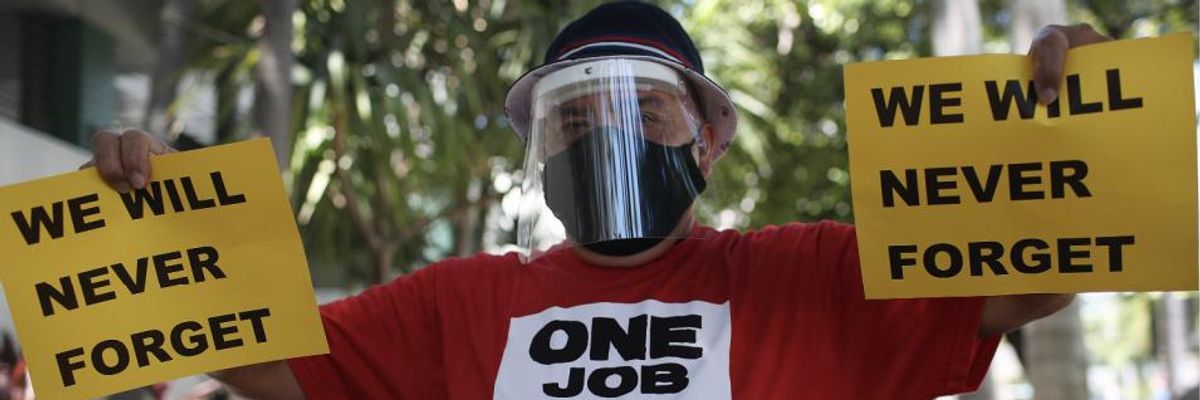With the world's death toll from Covid-19 above one million and confirmed cases surpassing 36 million, a pair of advocacy groups on Thursday released an analysis illustrating how governments' failures to implement policies that reduce inequality left countries "woefully unprepared" for the coronavirus pandemic.
The Commitment to Reducing Inequality Index, updated annually by Oxfam International and Development Finance International (DFI), ranks 158 governments based on three core pillars: spending on public services (meaning health, education, and social protection), progressive taxation policies, and workers' rights.
The new data and an accompanying report reveal that before the pandemic, only one is six countries were spending the recommended 15% of their budgets on health.
"In 103 countries, at least one in three of the workforce had no labor protection such as sick pay," the groups found. "Only 53 countries had social protection systems against unemployment and sickness, and they covered only 22% of the global workforce."
"Governments' catastrophic failure to tackle inequality meant the majority of the world's countries were critically ill-equipped to weather the pandemic," declared Oxfam interim executive director Chema Vera.
"No country on earth was trying hard enough to reduce inequality and ordinary people are bearing the brunt of this crisis as a result," Vera added. "Millions of people have been pushed into poverty and hunger and there have been countless unnecessary deaths."
The bottom 10 countries, which the index classifies as "least committed" to reducing inequality, were Haiti, Guinea-Bissau, Central African Republic, Oman, Vanuatu, Liberia, Chad, Bahrain, Nigeria, and South Sudan, which ranked last.
The United States--ranked 26th overall--came in last among G7 countries and trailed 17 low-income nations such as Sierra Leone and Liberia on labor, "due to anti-union policies and a very low minimum wage," Max Lawson, Oxfam's head of inequality policy, and DFI director Matthew Martin wrote in a blog post Thursday.
"Extreme inequality is not inevitable, and you don't have to be a wealthy country to do something about it," Martin said in a statement. "We know that policies such as free public healthcare, safety nets for people who can't work, decent wages and a fair tax system, have been proven to fight inequality."
"Failure to implement them is a political choice--one that Covid-19 has exposed with catastrophic economic and human costs," Martin added. "Governments must learn the lessons of this pandemic and seize this opportunity to build fairer, more resilient societies and a better tomorrow for us all."
Norway topped the index, scoring first in labor, 14th in public services, and 21st in taxation. The other countries in the top 10 from the combined scores of the three pillars were Denmark, Germany, Belgium, Finland, Canada, France, New Zealand, Austria, and Sweden.
A statement from Oxfam pointed out that "many countries near the top of the index, such as Germany, Denmark, Norway, and the U.K., have been back-tracking on policies that reduce inequality like progressive taxation for decades."
Lawson and Martin highlighted some progress that countries have made during the pandemic, noting that "South Korea boosted the minimum wage, Botswana, Costa Rica, and Thailand increased health spending, and New Zealand launched a 'well-being' budget to tackle issues like child poverty and inequality."
The pair served as the main authors of the new report, entitled Fighting Inequality in the Time of Covid-19 (pdf), detailing their findings and recommendations for how governments, international institutions, and other stakeholders can collaboratively tackle inequality.
The report urges governments to "dramatically improve their efforts on progressive spending, taxation, and workers' pay and protection" and various actors to "work together to radically and rapidly improve data on inequality and related policies, and to accurately and regularly monitor progress in reducing inequality."
"The coronavirus crisis has exposed the scale of inequality across the world and is likely to leave most countries even more unequal," the report says. "The need for all governments to rapidly commit to reducing inequality has never been more urgent."
The index and report were released a day after the World Bank warned that the public health crisis could push up to 150 million new people into extreme poverty by next year--a finding that came amid the revelation that the combined wealth of the world's billionaires hit a record $10.2 trillion during the pandemic.
